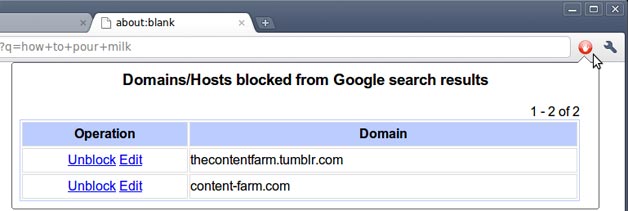Demand Media CEO Richard Rosenblatt, speaking on an earnings call today, took to defending his company’s content, which is often subject to a great deal of criticism, though I would contend that much of the criticism is really geared toward Google for surfacing some of the more questionable (in quality) content over other results that would appear more authoritative.
In reality, most of DM’s critics are often quick to acknowledge that they do produce some quality content, and I don’t think anyone has a problem with Google ranking that stuff well, when it makes sense.
Ok, maybe some have a problem with it. Alternative search engines Blekko and DuckDuckGo went so far as to remove all of the content from Demand sites like eHow and AnswerBag from their indexes entirely.
It is Google, however, that has been talking about focusing on content farms from the algorithmic standpoint, having even released a Chrome extension recently, which allows users to remove results from certain domains from their own search experiences – a move that actually sends Google signals that it could then potentially use in its ranking algorithm for all users.

Rosenblatt’s not worried about it though. At least that’s the position he’s taking. He told reporters that Demand Media is "very careful" about following Google’s guidelines, and that the company considers itself "very white hat".
Of course, Google’s "guidelines" can always change, and to reiterate, the company has explicitly said that its focus is turning to content farms, and Demand Media is the first company that everybody thinks of when the phrase "content farm" is used.
Demand’s properties, of course, come with heavy use of Google AdSense, and as many have pointed out in the past, Google would stand to lose some revenue itself, should content farms that take advantage of the ad platform be whisked away from prominent search placement.
Rosenblatt indicated that the company is looking toward expanding its own brand advertiser base, though, which would make it somewhat less reliant on Google (though getting those high rankings would still seem pretty key). "The company is well positioned to capture an increasing share of brand revenue," he said. Current advertisers include American Express, Home Depot, L’Oreal, Dole and Samsung.
As far as Demand’s quality goes, Rosenblatt said they won’t be able to catch everything, but they "promise to get better", and that they have a more rigorous editorial process than many mainstream media outlets. He also indicated that the company is working on some kind of "curation layer" that would let users make suggestions for the improvement of articles. Hat tip to Joseph Tartakoff at Paid Content.
More on the earnings here.